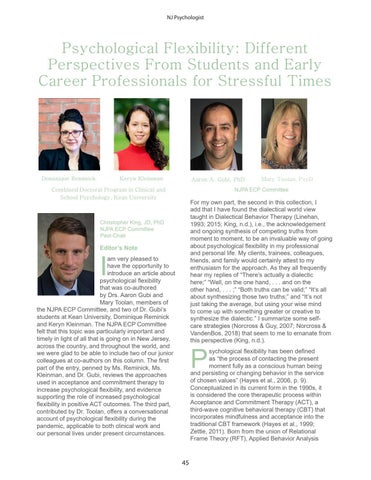NJ Psychologist
Psychological Flexibility: Different Perspectives From Students and Early Career Professionals for Stressful Times
Dominique Reminick
Keryn Kleinman
Aaron A. Gubi, PhD
Mary Toolan, PsyD
NJPA ECP Committee
Combined Doctoral Program in Clinical and School Psychology, Kean University
For my own part, the second in this collection, I add that I have found the dialectical world view taught in Dialectical Behavior Therapy (Linehan, 1993; 2015; King, n.d.), i.e., the acknowledgement and ongoing synthesis of competing truths from moment to moment, to be an invaluable way of going about psychological flexibility in my professional and personal life. My clients, trainees, colleagues, friends, and family would certainly attest to my enthusiasm for the approach. As they all frequently hear my replies of “There’s actually a dialectic here;” “Well, on the one hand, . . . and on the other hand, . . . ;” “Both truths can be valid;” “It’s all about synthesizing those two truths;” and “It’s not just taking the average, but using your wise mind to come up with something greater or creative to synthesize the dialectic.” I summarize some selfcare strategies (Norcross & Guy, 2007; Norcross & VandenBos, 2018) that seem to me to emanate from this perspective (King, n.d.).
Christopher King, JD, PhD NJPA ECP Committee Past-Chair
Editor’s Note
I
am very pleased to have the opportunity to introduce an article about psychological flexibility that was co-authored by Drs. Aaron Gubi and Mary Toolan, members of the NJPA ECP Committee, and two of Dr. Gubi’s students at Kean University, Dominique Reminick and Keryn Kleinman. The NJPA ECP Committee felt that this topic was particularly important and timely in light of all that is going on in New Jersey, across the country, and throughout the world, and we were glad to be able to include two of our junior colleagues at co-authors on this column. The first part of the entry, penned by Ms. Reminick, Ms. Kleinman, and Dr. Gubi, reviews the approaches used in acceptance and commitment therapy to increase psychological flexibility, and evidence supporting the role of increased psychological flexibility in positive ACT outcomes. The third part, contributed by Dr. Toolan, offers a conversational account of psychological flexibility during the pandemic, applicable to both clinical work and our personal lives under present circumstances.
P
sychological flexibility has been defined as “the process of contacting the present moment fully as a conscious human being and persisting or changing behavior in the service of chosen values” (Hayes et al., 2006, p. 9). Conceptualized in its current form in the 1990s, it is considered the core therapeutic process within Acceptance and Commitment Therapy (ACT), a third-wave cognitive behavioral therapy (CBT) that incorporates mindfulness and acceptance into the traditional CBT framework (Hayes et al., 1999; Zettle, 2011). Born from the union of Relational Frame Theory (RFT), Applied Behavior Analysis
45












